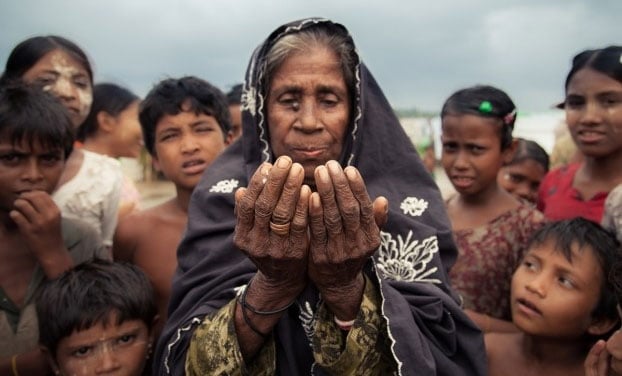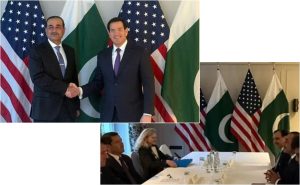Ideology Behind Muslim Ummah
Islam abhors ethnicity and territorial borders when it defines itself and its followers – the Muslims who now make up close to two billion of the world population which means about one-third of the people living on this planet. Islam strictly ties Muslims with each other on the basis of their shared ideology which revolves around unwavering faith in the Oneness of Allah, the Creator of the Universe. And His Messenger Mohammad (Peace be upon him), the last among 124,000 Prophets through whom the mankind and Jinns on the earth were guided that they would face the consequences of their deeds and misdeeds here and the life hereafter on the divine day of judgement.
What is at the heart of a divided Muslim Ummah?
Despite strict injunctions in the holy texts of Islam, Muslims have been divided on the basis of their ethnicity, cast, colour, and geography since 1924 when the over 13 centuries old Islamic Caliphate was dismembered in Turkey following World War I which started in 1913.
The British led alliance turned cities and provinces with Muslim population into countries on the basis of ethnicity and geography and thus the very ideology of Islam was confined to territorial limitations. Since then the very term of Muslim Ummah, or global Muslim nation, has virtually become a utopian ideology. Nonetheless, it perfectly exists in the holy texts of Islam and is still adhered to by the Muslims the world over. However, the very ideology of Ummah does not reflect in the conduct of the rulers and policies of governments representing overwhelming Muslim populations from North Africa to the Middle East, northeast to the south and central Asian states. The governments of these Muslim countries have pursued their economic and geostrategic interests while giving lip service to help the persecuted Muslims in Palestine occupied by Israel, Kashmir under illegal control of India and marginalized Muslim minorities in Burma.
Territorial limitations & vested political interests
Muslim countries have largely confined their ideology to the geography and racial profile of populations, which goes against the very core of Islam. This has reflected in the geo-strategic and political interests of the rulers and governments which define themselves more according to their vested political interests than the ideology of the population they represent.
The Organization of Islamic Cooperation (OIC), an umbrella forum of Muslim states, which in theory should have devoted itself to the causes of persecuted Muslims, has in reality turned out to be a debating forum. It discusses the plight of Muslims and passes shallow resolutions every year vowing to fight for the causes of persecuted Muslims. However, their efforts to help the suffering Muslims do not go beyond providing handouts to them whenever they are bombarded by the hostile forces like Israel, Burma and India and many others. They hardly ever take up issues linked with their plights with the UN and whenever they do so, they hardly follow it up, reflecting how insincere they are with the persecuted Muslim populations.
In a strategic global environment where nuclear standoff prevails, no Muslim country is willing to compromise its own strategic interests for the sake of adhering to the cause of Muslim Ummah. Therefore, Muslims have suffered tremendously everywhere, most recently in Burma where Buddhist army killed thousands, burnt towns after towns to ensure Muslims are forcibly expelled from their land despite living there over the course of centuries. A little less than half of the 1.1 million Muslim population has reached the Bangladeshi borders. And so far the only visible help has come from Turkey which has vowed to bear their expenses for makeshift arrangements at Cox’s Bazar. Far behind public expectations, realistically speaking that is the maximum any Muslim country in a given strategic environment would do. Expecting them to militarily help persecuted Muslim seems out of the question when economic and geostrategic interests of Muslim states hinge upon the powerful countries like China, Russia and the US which directly or indirectly are backing governments in Israel, Burma and India.
Pakistan’s former Prime Minister Zulfiqar Ali Bhutto and Shah Faisal, the king of Saudi Arabia tried to bring greater unity within the ranks and files of Muslim countries in the 1970s. However, they were assassinated and that speaks volumes about whose interests would be compromised if and when Muslims unify from within their ranks and files.
Israel defeated the Arab States in wars of 1967 and 1973. Since then, by and large, they have virtually given in to the cause of Palestinians. The situation has exacerbated now to the extent that Arab rulers from Egypt to Saudi Arabia are perceived to be in league with Israel in containing Palestinians armed resistance against Israel in occupied Gaza and West Bank. This has helped Arab militants to exploit the situation to their advantage to recruit more and more people to launch and sustain insurgency in Iraq, Syria, Yemen, Libya and parts of Egypt.
Militancy & Persecution of Muslims
Indian occupied Kashmir
The spectacular dismemberment of USSR in the early 1990s was a turning point in using insurgency as a tool to defeat a powerful enemy. Pakistan allegedly encouraged insurgency in Indian occupied Kashmir region which over the course of decades has become so lethal that New Delhi had to deploy over 600,0000 troops in a failed attempt to quell it. This led to the killing of 150,000 Muslims, disappearances of over 10,000 and raping of thousands of women in held Kashmir. And yet there is no sign that Muslims in Kashmir are anywhere near gaining freedom from India despite massive uprising particularly since July 2016. Any concrete help to Kashmiri insurgents would mean a nuclear war between Pakistan and India, a strategic risk Islamabad would not like to undertake.
Afghanistan and Arab militants
Taliban were the byproduct of Afghan Jihad against the then USSR in the 1980s. Arab militants joined Afghan warriors who were sheltered by the late Mullah Umar, the founding Taliban chief.
After 9/11 attacks, Umar refused to hand over Osama Bin Laden to the US strictly adhering to the holy text of Islam about Muslim Ummah which urges its followers not to betray a brother in faith. This led Umar to lose his government which had sheltered Arab fighters who fought along with militants against the then Soviet Union troops and subsequently Northern Alliance in Afghanistan which was supported by India and Iran against the Taliban before 9/11 attacks in the US by Alqeada.
Mother of militancy
At the heart of the militancy from Afghanistan to Middle East and North Africa, lies an illegal occupation of Palestine by Israel, a theological state which systematically killed, maimed tens of thousands of Muslims and forcibly expelled millions of them from their homeland from 1948 on the pretext that Palestinian territory was the chosen land for the Jews. And there is no letup in atrocities being committed against them since then.
In a video message, the late Osama Bin Laden recalled how in the early 1980s he in fact originally planned to avenge the killing of innocent Palestinians when Israel killed Palestinian children in Lebanon. Al-Qaeda leaders long ago reached the conclusion that the US must pay the price for its unconditional support to Israel which has been supported by Americans militarily and financially over the course of decades.
Muhammad Atif, the strategic commander of Alqaeda who was killed in Afghanistan after US invasion in 2001, had a strategy which he shared with an Arab journalist in 1998. Alqaeda reached the conclusion that they cannot change the status quo in the Middle East as long as the US continues its support to Israel and Muslim monarchs.
Weakening the US economically was the key part of its strategy which was to exhaust Americans militarily in a long drawn insurgency in Afghanistan by attacking twin towers in New York and Pentagon. Al-Qaeda’s assessment was that American would come after them in Iraq and Yemen and militant groups would be able to stoke revolt in the entire Middle East. The militants made territorial gains and fanned Anti-American sentiments from Afghanistan to the Middle East and North Africa more because of strategic blunders of the US and less due to the success of Alqaeda’s own strategy. The American invasion of Iraq in 2003 added fuel to fire to the insurgency in most countries with overwhelming Muslim population.
Declaration of Caliphate
Daesh in Iraq and Syria has been an offshoot of Al-Qaeda. In 2013, it proclaimed Muslim Caliphate in Iraq and Syria on the grounds that it would reunite the Middle East and other Muslim states in North Africa to reestablish the caliphate which they stated was the only way out to bring an end to the sufferings of Muslims. Other militants groups refused to accept their self-styled Caliphate. Daesh misinterpreted the signs of End of Time prophesied by the last Prophet of Islam Muhammad (peace be upon him). With this, they attracted large numbers of Muslim youths in thousands from the world over.
The Syrian dictator Bashar ul Asad deliberately allowed Daesh to occupy the territories to counter other militant groups which were ideologically more acceptable to people. Similarly, the Iraqi regime systematically surrendered the territories to Daesh. Israel and Americans also exploited the situation to their strategic advantages. The US provided Daesh with all kinds of weaponry through the Arab States and Turkey. American created fake videos showing brutalities of Daesh and it was designed to cast negative shades on Islam. Such media warfare by the US and Britain was aimed at scaring away people in the West from Islam in an effort to sustain support for war in the Middle East.
Daesh after being driven out of Middle East now has been spreading in every Muslim country. Unwittingly it has become a tool in the hands of global intelligence agencies to stoke violence in the West and Muslim countries. The so-called Islamic State has been tarnishing the very image of Islam which clearly defined who and who should not be killed in the battle, something Daesh seems to be least concerned with.
US & Israel Strategy to neutralize militancy
The US support for Arab Spring which started in Tunisia in 2010, was designed to counterinsurgency through democratizing Arab society. The uprising later turned into full-fledged insurgency particularly in Libya and Syria and partially in Egypt. Arab Spring especially turned into a lethal insurgency in Syria which led to the killing of an estimated 6,00,000 people and displacement of half of total 22 million population after the US, Russia and Iran turned this Arab state into a war theatre. Militants at one point of time had taken over 75 percent territory of Syria. Their territorial gain, however, reversed after Russia resorted to carpet bombing with the tacit American support as the US subsequently preferred to put up with a brutal dictator in Syria than those of militant groups whose armed struggle has been aimed at reestablishing Caliphate as per holy texts of Islam.
Similarly, the US through Saudi Arabia backed military coup in Egypt to overthrow an elected President Mohamed Morsi of Muslim Brotherhood who tried to Islamize the society and fight for the causes of persecuted Muslims in the Middle East.














